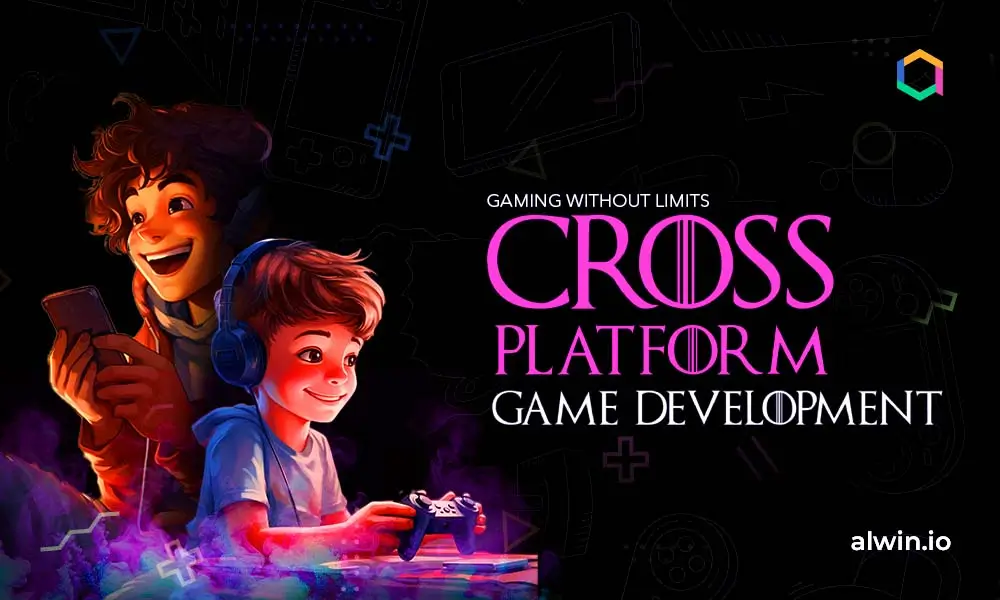How quickly is the world changing? Toward technological advancements!
The gaming landscape has come a long way, evolving from early classics like Tennis for Two to the immersive realms of virtual reality (VR) and augmented reality (AR). This transformation not only captivates gamers with its engaging experiences but also influences various sectors across the board. Advanced technologies are reshaping numerous industries, much like the impact of video games. Game development companies are now focused on creating exceptional titles that can be enjoyed on multiple platforms. In this blog, we will explore what cross-platform gaming is, its significance, and the stages involved in its development.
What is a Cross-Platform Game?
A video game that can be played on different platforms or operating systems, such as PCs, consoles, and mobile devices is called a cross-platform game. This improves the game experience and increases the number of players by enabling interaction and play among players on various platforms. Features like synchronized updates across various devices, multiplayer matchmaking, and shared progress are examples of cross-platform compatibility.
Cross-Platform Game Development
You know, cross-platform game development is a pretty exciting trend in the gaming world. It is all about creating games that can work smoothly on different platforms without needing a ton of changes to the code. This means developers can reach a much bigger audience and let friends play together, no matter what device they are using. Plus, it makes the whole development process a lot easier and more budget-friendly. With powerful game engines like Unity and Unreal Engine, along with some cool backend services, developers can make sure players have a consistent and top-notch gaming experience. And as technology keeps evolving, cross-platform development is going to be a big player in the future of gaming.
Popular Cross-Platform Video Games
Cross-platform gaming has gained immense popularity, allowing players to enjoy their favorite titles together, regardless of the device they are using. Here are some of the most popular cross-platform video games that have successfully brought players together
Fortnite
On a variety of platforms, such as PCs, consoles, and mobile devices, gamers can engage in intense battle royale engagements. Fortnite's lively visuals, frequent updates, and interesting events have helped it create a significant, unified gaming community.
Minecraft
Players can construct and explore together in shared worlds in Minecraft, a game renowned for its boundless creativity. Players of all ages love it because of its cross-platform features, which enable smooth collaboration between users on consoles, PCs, and mobile devices.
Rocket League
Combining soccer with rocket-powered cars, Rocket League offers thrilling multiplayer matches that can be enjoyed across PC, PlayStation, Xbox, and Nintendo Switch. The game’s unique concept and competitive nature have made it a staple in the esports scene.
Apex Legends
This free-to-play battle royale game features squad-based gameplay and diverse character abilities. Apex Legends supports cross-platform play on PC, PlayStation, and Xbox, allowing friends to team up regardless of their chosen hardware.
Call of Duty: Warzone
As part of the popular Call of Duty franchise, Warzone offers an engaging battle royale experience that supports cross-platform play. Players can join forces or compete against each other across PC, PlayStation, and Xbox platforms, improving the competitive landscape.
Genshin Impact
This action role-play game (RPG) offers a vast open world filled with exploration and adventure. Genshin Impact supports cross-platform play across PC, mobile devices, PlayStation 4, and PlayStation 5, allowing players to team up regardless of their device.
Best Game Engines for Cross-Platform Game Development
In the present, players can connect across multiple devices as a result of cross-platform game development. This invention promotes lively communities and improves accessibility. Let us examine the best game engines that enable programmers to produce engaging cross-platform games.
1. Unity
Unity is a powerful and versatile game engine that has become a favorite among both indie developers and large studios, making it a top choice for a Unity 3D Game Development Company. With its reflexive interface, extensive asset store, and strong documentation, Unity makes it easy for developers to prototype and build complex game mechanics. The engine also offers a comprehensive suite of tools for animation, physics, and rendering, allowing for high-quality visuals and immersive experiences.
Cross-Platform Support: Unity supports a wide range of platforms, including PC (Windows, macOS, Linux), consoles (PlayStation, Xbox, Nintendo Switch), and mobile devices (iOS, Android). It also enables WebGL export, allowing games to run directly in web browsers, and broadening accessibility.
2. Unreal Engine
Unreal Engine is a standard for AAA game production, making it a cornerstone of Unreal Engine Game Development due to its renowned advanced visuals and powerful features. Developers can create stunning, immersive worlds with complex gameplay dynamics using Unreal's sophisticated visual scripting language (Blueprints) and advanced rendering techniques. The engine is suitable for a variety of genres, including simulations, action, and adventure games, particularly because of its emphasis on realism and detail. Additionally, its extensive collaborative development capabilities enhance teamwork within large groups.
Cross-Platform Support: Unreal Engine offers extensive cross-platform support, enabling developers to deploy their games on PC (Windows, macOS), consoles (PlayStation, Xbox, Nintendo Switch), and mobile devices (iOS, Android). This flexibility allows for a unified gaming experience across different hardware.
3. Godot
Godot is an open-source game engine that offers a lightweight and flexible option for both 2D and 3D game development. Its unique scene system and user-friendly scripting language, GDScript, make it super easy for developers to organize their projects and build complex gameplay mechanics without the extra hassle. One of the best things about Godot is its vibrant community and extensive documentation, which provide plenty of support for developers of all skill levels. This collaborative atmosphere really helps everyone feel connected. Moreover, its modular design allows for easy customization, making it a fantastic choice for indie developers eager to bring their creative ideas to life.
Cross-Platform Support: Godot shines by letting developers export their games to various platforms, including Windows, MacOS, Linux, Android, iOS, and HTML5. This broad compatibility allows the game to reach a diverse audience across different devices.
4. Cocos2d-x
Cocos2d-x is a widely used open-source framework specifically designed for 2D game development. Known for its performance and flexibility, Cocos2d-x provides a rich set of features that help developers create visually appealing and engaging mobile games. Its efficient rendering engine, support for various scripting languages, and extensive libraries make it an excellent choice for those focused on mobile platforms. Cocos2d-x also benefits from a strong community and a wealth of resources, making it easier for developers to find solutions to common challenges.
Cross-Platform Support: Among the many platforms that Cocos2d-x supports are Windows, macOS, iOS, and Android. Developers may reach a large audience while preserving great performance and quality due to this cross-platform feature.
5. HTML5
HTML5 is a game-changing markup language that has transformed web development by allowing the creation of interactive and responsive content that runs directly in web browsers. Its ability to manage multimedia, animations, and complex game logic gas made HTML5 a popular choice for browser-based games. One of the biggest advantages of HTML5 is that it allows developers to create games that are easily accessible on any device with a web browser, so there is no need for downloads or installations. Its seamless integration with CSS and JavaScript offers a flexible and powerful framework for building a wide range of gaming experiences.
Cross-Platform Support: Games developed with HTML5 can be played on virtually any device, including PCs, tablets, and smartphones. This universality allows developers to reach a vast audience without the restrictions of traditional platform-specific development.
Benefits of Cross-Platform Game Development
Cross-platform game development comes with a ton of benefits that improve both how games are made and how players enjoy them. Here are some of the key benefits:
Wider Audience Reach
Creating games that work across multiple platforms opens the door to a much larger player base.
It increases potential sales and engagement of the game due to the access of large players, allowing them to play from anywhere and anytime whether players prefer consoles, PCs, or mobile devices.
Greater Player Engagement
Players or friends can connect and play the games together, no matter what hardware they are using. This builds a strong sense of community and interaction, leading to higher player satisfaction. When you are playing the game with your friend, it gives an immersive and interactive experience while completing hard levels and missions, making it memorable and encouraging long-term loyalty to the game.
Cost Efficiency
It can be a game-changer for developers to create a single version of a game that works on several platforms. Rather than developing distinct builds for every device, companies can focus on refining a single codebase. Time is saved, and total development expenses are decreased, helping developers to focus resources where they are most needed.
Constant Updates and Maintenance
Updates, patches, and new material may be released more easily when there is a single codebase. Players on all platforms receive the same changes simultaneously as they are made, guaranteeing that everyone has a smooth and consistent gaming experience.
How are Cross-Platform Games Developed?
Developing cross-platform games delves into complex processes and it requires advanced technologies for the seamless experience across devices.
1. Choosing the Right Game Engine: Pick an appropriate engine that offers the necessary development tools and supports a variety of platforms, such as Unity or Unreal Engine.
2. Creating Multi-Platform Designs: To guarantee a consistent user experience, create flexible designs that consider various screen sizes, input methods, and performance factors.
3. Using a Unified Codebase: Keep a single codebase that is compatible with several platforms to expedite development and enable platform-specific modifications as needed.
4. Cross-Platform Networking Implementation: Make use of backend services to enable smooth player login, matchmaking, and device data storage.
5. Testing Across Systems: To find and fix problems and guarantee balanced gameplay and performance, thoroughly test on all target systems.
6. Constant Maintenance and Updates: To keep gamers interested, provide a streamlined procedure for concurrently releasing updates to all platforms.
7. Feedback Collection and Iteration: Actively seek player inputs to improve gameplay and guide upcoming releases, making sure the game satisfies community demands.
Why Choose WeAlwin Technologies for Cross-Platform Game Development?
Developing a cross-platform game requires a deep understanding of technical expertise, and it delves into the complex process of game development. As a Best Game Development Company, WeAlwin Technologies delivers top-notch cross-platform game development services. Our expert team is cognizant of various game engines and understands your project requirements to develop the cross-platform game specified for your business. Join us in the way of the advanced gaming world and build an exceptional gaming experience that captivates players in the gaming landscape.



